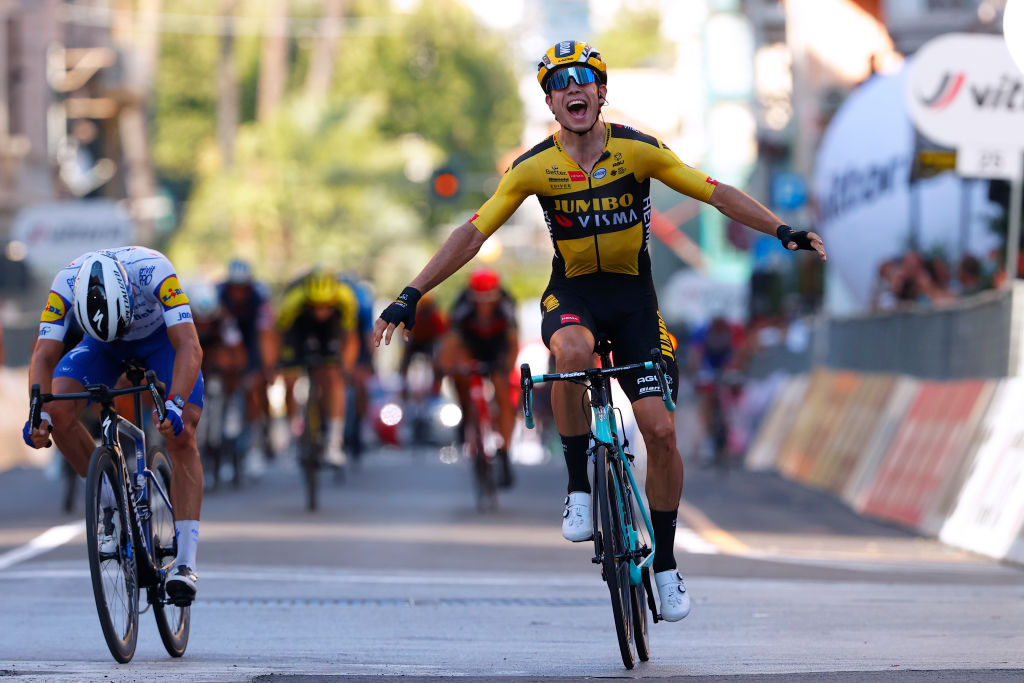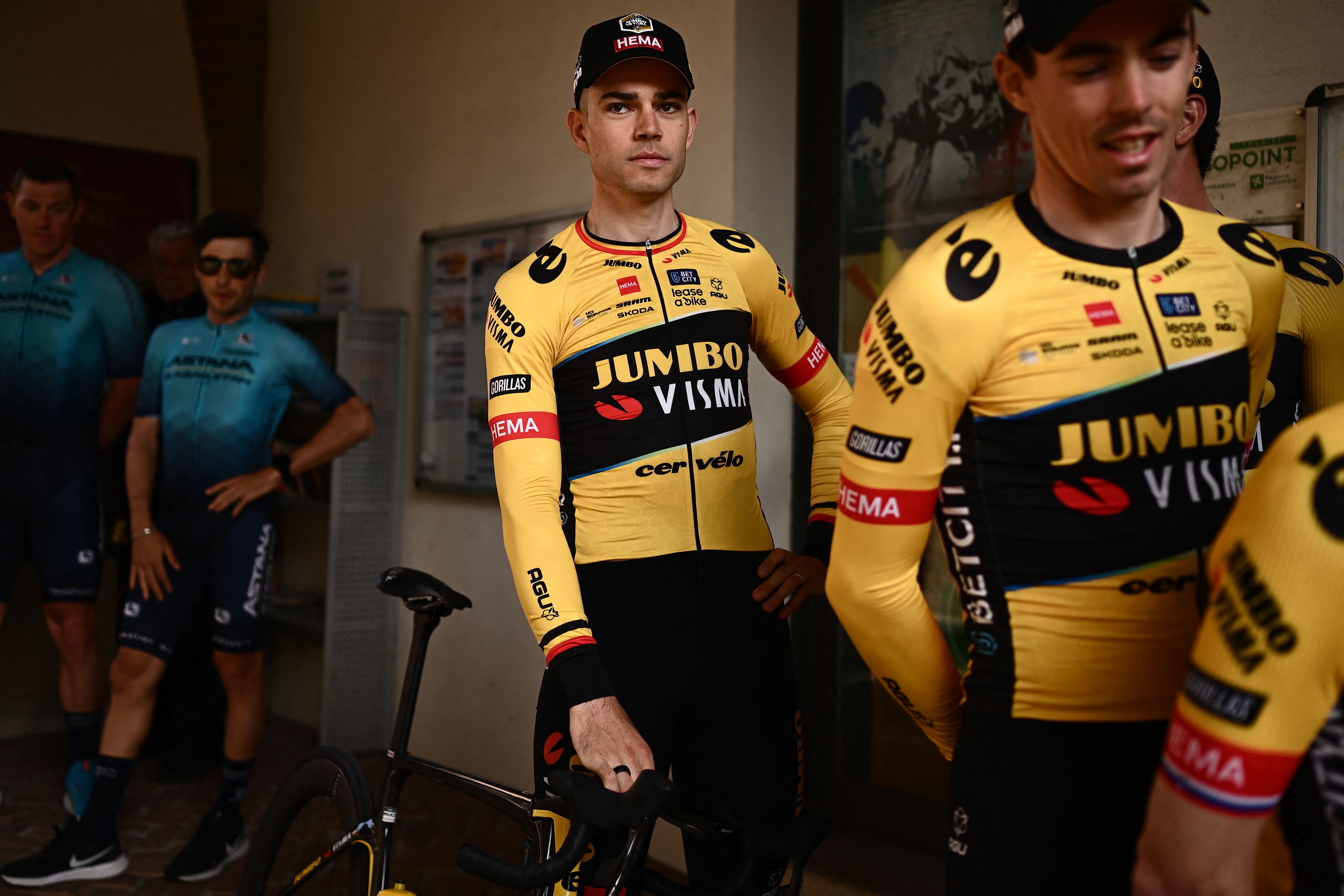Wout van Aert: I don’t think I have to prove anything
Belgian acknowledges Pogacar's presence alters dynamic at Milan-San Remo

In previous years, Wout van Aert has warmed up for Milan-San Remo by very publicly running through his vast repertoire in early March. This time around, his approach to the race has been rather more sotto voce, but he will still be expected to hit all the familiar notes over the Cipressa and Poggio on Saturday afternoon.
“I think my shape is less than last year,” Van Aert told reporters earlier in the week. “Last year I was already really good in Opening weekend and Paris-Nice, and it was important to keep that level. This time, I’m hoping to improve a little bit.”
In 2021, Van Aert won a brace of stages and placed second overall at an especially intense edition of Tirreno-Adriatico, a performance that reiterated his all-terrain abilities. Yet despite victories at Gent-Wevelgem and Amstel Gold Race later that spring, it was hard to shake off the nagging sense that he might have given too much of himself in March.
Two years on, his build-up has been altogether different, though Van Aert stressed that this had come about by accident rather than design. After a bout of illness interrupted his training in February, he opted to forgo his planned seasonal debut at Strade Bianche, while Tirreno-Adriatico was essentially relegated to the status of preparatory race.
“Initially, the intention was to start on top form at Strade and then hold that for the whole Spring. Now it's more about growing towards that,” said Van Aert, who was largely content to play a supporting role for winner Primoz Roglic in Italy last week.
The one stage that Van Aert had earmarked in the road book, the uphill finale in Tortoreto, was ruined by a crash of his own making in the finale, but the incident caused no lasting injury. Although he didn’t pick up a result of note, he may well have got what he needed out of Tirreno-Adriatico all the same.
“It doesn't bother me that I didn’t win a stage at Tirreno, that wasn't the most important thing in the race,” Van Aert said. “But as I said beforehand, it is important to have a goal, so I did want to go for it on that day [in Tortoreto]. If I didn't have the legs, it would have been frustrating, but falling was of course very frustrating too.”
Get The Leadout Newsletter
The latest race content, interviews, features, reviews and expert buying guides, direct to your inbox!

Pogacar
Van Aert’s lone Monument victory to date came at the pandemic-delayed Milan-San Remo of 2020, when he tracked Julian Alaphilippe over the Poggio and then outsprinted the Frenchman in a gripping finale on the Via Roma. When it was put to him that he thus no longer had anything to prove in La Primavera, Van Aert bristled politely at the tacit implication that he still has it all to do at the other Monuments, most notably at the Tour of Flanders and Paris-Roubaix.
“Even though it seems people are saying more and more that I have to win almost everything, I don't think I have to prove anything,” Van Aert. “I want to win every important race and that motivation is there in San Remo, even though I already won it. In the Ronde, it's also there. I'm at the start with the same objective.”
Later, when Van Aert was asked about the perception that his running tally of Monuments is not yet commensurate with his ability, he opted for a diplomatic line: “I think that says a lot about expectations, but in the end it's positive that people look at you like that kind of respect."
Such is the respect afforded to Van Aert by his peers, meanwhile, a straw poll of riders at the pre-race presentation in Abbiategrasso on Friday afternoon suggested he was an obvious favourite for Milan-San Remo, despite his lack of results so far in 2023. The tag is shared, however, with the inimitable Tadej Pogacar, so dominant at Paris-Nice last week, and Van Aert acknowledged that the Slovenian’s very presence changes the dynamic of the race.
“I think so anyway. Last year he really made the race tough and attacked countless times on the Poggio, and I used up my best bullets there. It’s different from having one real acceleration or not really racing until the very end,” said Van Aert.
“In the last years, the race has developed more into one for attackers and Tadej is probably the strongest competitor for all of us. You never know where he’s going to launch, but for sure he’s going to make the race hard for all of us.”
Van Aert will be backed by a redoubtable Jumbo-Visma squad, even if he suggested a racing for a team with multiple options was less important at Milan-San Remo than on the cobbles. “Christophe Laporte would normally be just below me, but he was sick and he’s still coming back,” he said. “At San Remo, I'm more the forward man for the team, but in the Flemish Classics we’ll all start on the same level.”
And yet, for all that Milan-San Remo follows a familiar template as far as the finale every year, the breathless last half-hour of racing sees the contenders faced with a rapid succession of split-second decisions. Even the most minor choice can have outsized consequences, and the smallest gaps can stubbornly refuse to close on the drop off the Poggio into San Remo.
“It's a special race where everything has to fall right, rather than the best automatically coming out on top. But I always feel that when you are 100%, then you make the best decisions,” Van Aert said. “It can be difficult not to respond to attacks, but sometimes you have to gamble, and I think I do that too little or race too nervously. I'm still learning."

Barry Ryan was Head of Features at Cyclingnews. He has covered professional cycling since 2010, reporting from the Tour de France, Giro d’Italia and events from Argentina to Japan. His writing has appeared in The Independent, Procycling and Cycling Plus. He is the author of The Ascent: Sean Kelly, Stephen Roche and the Rise of Irish Cycling’s Golden Generation, published by Gill Books.